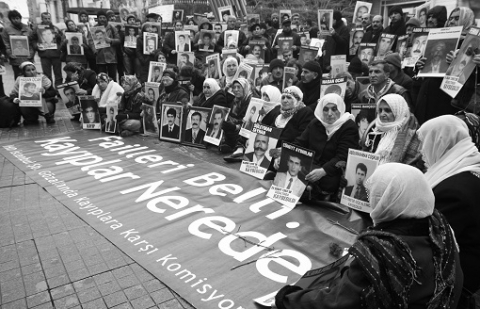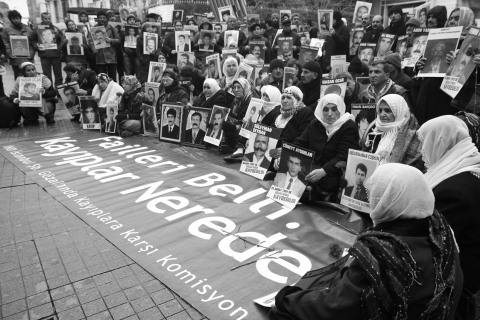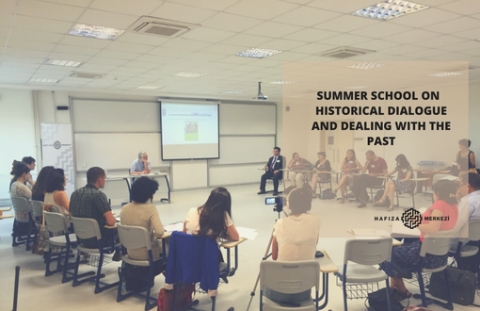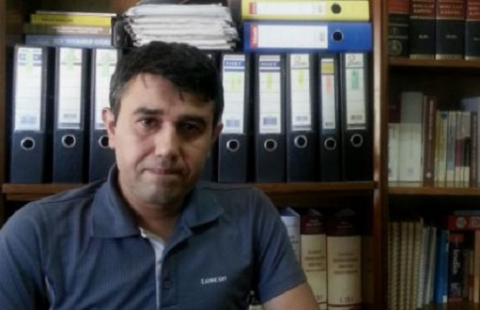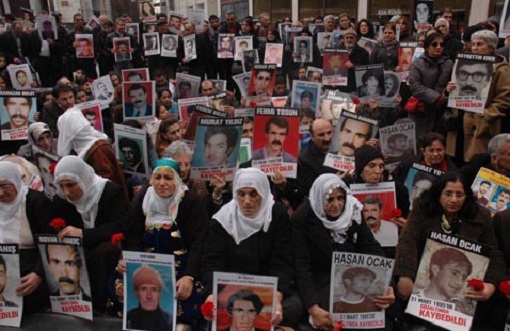
Emel Ataktürk
On 30 August, the United Nations International Day of the Victims of Enforced Disappearances, we invite Turkey to apologise to the victims for making its citizens forcibly disappear, to bring an end to impunity and to sign the UN International Convention for the Protection of all persons from Enforced Disappearance.
Following the 1980 military coup d’état in Turkey, various changes in the political and social spheres were accompanied by a shift in the methods used in fighting opponents of the regime. A new method, known in Turkish literature as “persons missing in custody” and referred to as “enforced disappearances” within International Law, was added to the list of murderous methods implemented by the state.
This strategy of taking persons into custody, abducting and disappearing them, which was brought to the agenda in 1980 when the army took over the government, increased rapidly following the announcement of a state of emergency. Thousands of civilians fell victim to political murders and even the location of their graves remain unidentified.
The idea that the murders were related to persons and institutions connected to the state (such as the Gendarmerie Intelligence and Counter Terrorism (JİTEM), National Intelligence Organization (MİT), members of the Special Forces Command, confessors and village guards) was verified in many publications and legal documents, including investigation reports put together by the Grand National Assembly of Turkey (TBMM) and the Prime Ministry.
Turkey saw six different prime ministers between 1991 and 2001: Four major political parties, Mortherland Party (Anavatan Partisi), True Path Party (Doğru Yol Partisi), Welfare Party (Refah Partisi) and Democratic Left Party (Demokratik Sol Parti) each came into power. Yet nothing changed in terms of enforced disappearances and political murders. Offenses were not investigated and the context in which they occurred was completely ignored.
The governments of this period covered up these awful practices in order to prevent “state secrets” from becoming publicly known. The judiciary contributed to this process by remaining silent and failing to conclude cases.
The awful 90s
On Nov. 3, 1996, a car rear-ended a truck in Susurluk town, which later became the namesake of an infamous case. The Susurluk accident later named as the Susurluk Scandal; involving a parliamentarian, a police official and a fugitive rightist militant member of a shadowy illegal organization, presented an incredible opportunity to reveal the alliance between politicians, the mafia, soldiers and the police, which was organized at the state level. Yet the judiciary failed to take advantage of this opportunity as well. It seems as though the recent Ergenekon, Temizöz, JİTEM and Çitil cases will also fail to get close to revealing the real dimensions of this state-level organization.
Uncertainty still remains over how internal political balances in Turkey changed after 1990, and how the politics behind practices of violence under the name of the “fight against terrorism” in 93 and 94 should be read. What is certain, however, is that the number of people who were forcibly disappeared started to increase dramatically with the announcement of a state of emergency, reaching its peak in 93 and 94, and started to decline afterwards.
During these years, when, according to JİTEM Commander Cem Ersever’s definition, an ‘unconventional warfare’ strategy was being followed in the fight against the PKK, important military and political figures lost their lives one after another in suspicious ways. All the obstacles in the way of implementing the planned strategy were removed.
In 1993, General Commander of Gendarmarie Eşref Bitlis (17 January), Finance Minister Adnan Kahveci (5 February), President Turgut Özal (17 April) and Gendarmerie Diyarbakır Regional Commander Bahtiyar Aydın (22 Ekim) suspiciously died one after another. While JİTEM’s involvement in the murders was being discussed by the public, JİTEM Commander Ersever was killed on 4 November of the same year.
State Crime
While none of the investigations concerning the deaths of the named state officials have yielded any results to this day, suspicious deaths and suicides have continued.
It is not easy to come to terms with such a period that lasted so long and traumatized society in different ways. Yet in these days when we have high hopes of entering a peace process, we need to confront these issues in order to reduce tension, to achieve reconciliation in society and to understand each other more now than ever.
It is exceedingly important that the state, as the part that caused grievances, assumes responsibility for all rights violations, in order to assure victims that compliance with the principles of law is ensured, that violations have been identified, and that a line between what is just and unjust is drawn.
For societies, reckoning with the past – just like it is the case for individuals – holds more value in terms of confronting the present and the future, than it does for the past. Rendering violations visible and holding those who are responsible accountable will enhance collective healing and strengthen the desire to live together, as well as a sense of trust.
Political murders and policies based on suppression by the state are not, and cannot be ‘normal’ political methods. That is why countries trying to come to terms with a history of military coups have discussed the concepts of ‘state terror’ and ‘state crime’ in law for a long time. These concepts have even been given legal definitions in some of these countries (such as Argentina).
One of the main reasons why democracy could not be institutionalized in Turkey is the denial of state crimes. All these methods have both been used historically and also remain as customary practices of the state.
If the failure to hold accountable in law military and paramilitary/civilian forces that have taken part in acts of enforced disappearances is a choice, then we need to genuinely think about what this choice means and the dangers it presents for democracy.
An approach which reduces the status of human life into a ‘minor detail’ when “the supreme interests of the state” are at stake should be opposed by members of the legal profession more than anyone else. The silence, negligence and the occasional active support by the judiciary for the process of impunity must come to an end.
Constitutional duty
The judiciary should protect citizens’ rights and freedoms instead of the state. With impartiality and courage, it should investigate any kind of political murder without regard to the identities of the parties involved, the timing of and the reason for the incidents. (We hope that the Musa Anter case and the investigation on JİTEM-related mass graves in Mardin Kızıltepe will be a beginning).
Thousands of people were taken into custody and were forcibly disappeared during the climate of terror in the 90s. The murderers of those whose heads and organs were separated, burnt, thrown out of helicopters and who were tortured to death still live among us. The period’s political, military and administrative officials were not investigated or held accountable. In fact, they were protected, favoured and promoted.
Yet those who were forcibly disappeared and killed are not just numbers or case files: They are someone’s mother, father, daughter, spouse or sibling. They were taken from their homes, the street or their workplace, while living among us, and were forcibly disappeared through torture. Many of them still do not have graves and their relatives are condemned to live with a never-ending wait.
The state has an obligation to identify the suspects of this intense process of atrocity, to bring them to justice, punish responsible parties and to compensate for victims’ losses. Ending impunity is neither a courtesy for this country, nor is it optional. It is the constitutional duty of the Republic of Turkey and is a legal obligation under international conventions, to which it is a party.
